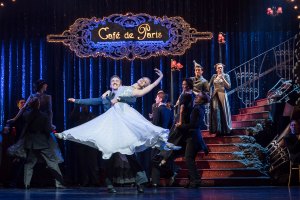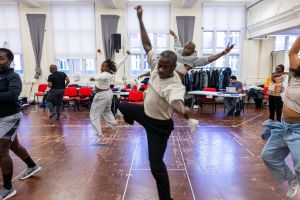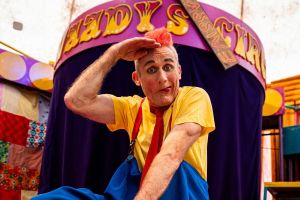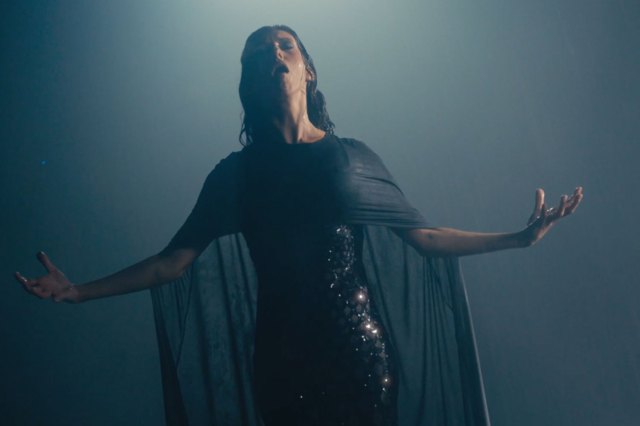Katori Hall on Our Lady of Kibeho: I had to bear witness to the story of Rwanda
The Olivier Award-winning writer’s new play premieres in Northampton this month
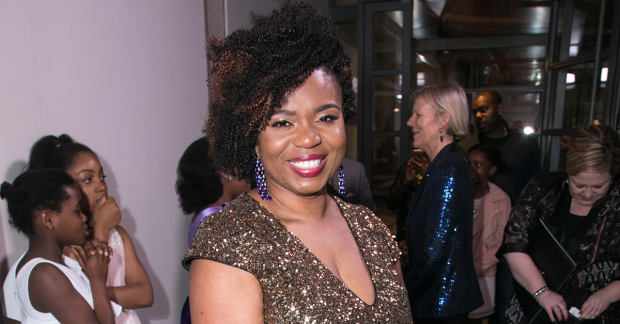
© Dan Wooller for WhatsOnStage
Katori Hall's 2014 play Our Lady of Kibeho has its UK premiere in Northampton this month, following the writer's previous successes including the Olivier Award-winning The Mountaintop. Set in 1981, the piece is based on the true story of three Rwandese girls who have visitations by the Virgin Mary. During these visitations, they are warned of a terrible war to come and thousands of lives ruined. In 1994, 13 years after the visitations at Kibeho, Rwanda experienced a major genocide, with an estimated 1 million people dying or disappearing.
Can you describe Our Lady of Kibeho?
Our Lady is based on a true story about three young Rwandese girls in 1981 having a visitation from the Virgin Mary – except at first, no one believes them. So it's then about their struggle to convince people that there is a goodness in the world. Things then change however once the Virgin Mary starts issuing a warning about a terrible war coming and it makes them question their faith and the goodness of others.
Why did you pick these events as the subject for a play?
I went to Rwanda for the first time in 2009 to attend a genocide conference and, as part of my trip, I visited a lot of memorial sites and had many talks with people who had been either victims of the genocide or perpetrators of the genocide. We ended up visiting the Kibeho college and that was when I heard the true story of the three girls who from 1981 to 1982 had visitations. The local priest told us the story and I knew it had to be seen as a play. It's a tale about belief, and theatre is about the suspension of disbelief, so I felt like the theatre space and drama was the right way to tell the story.
You've written about Rwanda before in shows like Children of Killers – what does the country mean to you?
The country is important to me because an incredibly horrible thing happened there in 1994. Almost a million people were killed, or disappeared due to a perceived difference in perceived ethnicity, an imposed ethnicity. Me being African American and having inherited a history of oppression and racism and that then being exacerbated by sexism and classism, I look at a country that has faced these imposed divisions and it fills me with empathy. I had to bear witness to the story of Rwanda. A lot of people who need to be spoken for are dead. They're in the ground, not even truly buried in the way they deserve.
Has the play's relevance changed since it first opened in 2014?
I hope the relevance of everything I write stands. Our Lady is all about whether or not the girls really did see the future and see the genocide, but if they saw 1994, they might have also seen past that to 2024, we just don't know. Things like what happened in Rwanda aren't ever over – there might be a mutation, but even to this day there is a tightness in the country and a fear about talking about the events of 1994 and awaken the past demons and ghosts. In reality, you need to purge them.
Has the show changed between New York and Northampton?
There are minimal changes between New York and here – in New York we didn't name all the girls in the Kibeho visitations, but for the purposes of this run we wanted to further individualise each girl and give them a name. In New York we only had 11 actors and Northampton will have more than that (as well as a community chorus) – a better reflection of the fact that, eventually, hundreds and hundreds of people came up the hills of Kibeho to be blessed by these girls.
The show has a large community chorus involved – could you explain why that was an important part of the staging?
The chorus is extremely important because the play is about how it started from one girl, then two more, and then their message spreading across the world. I am a person who always writes about community and who really revels in group dynamics. I think having a community chorus is a visual metaphor for how things move from one person to an entire village, and from one country to all around the world. I also love having a lot of people on stage – you can have a big group being impacted in lots of different ways.
The show sees you reunite with director James Dacre after the award-winning original production of The Mountaintop in 2009 – what is it about your working relationship that works so well?
James and I both love to tell stories that embrace big ideas but also embrace singular, intimate moments. I've always loved James' approach to working on plays and how investigative he is. His work has a deep purpose, it wants to change the world and wants to transform people. His performances feel like going to church. They're spirit-filled. I'll always be excited by working with him – he helped jumpstart my career, there were times when we stayed up until 2am, 3am at a pub just trying to figure out scenes from The Mountaintop.















